 |
★ ♥ ★ A Multicultural Community that unites people from all over the world ★ ♥ ★ |
 |
 |
Islamic Manuscripts |
 |

02-05-2010
|
 |
RHTDM
KALKI is offline
|
|
Join Date: Mar 2003
Location: I own a tent, it has a hole in it.
Posts: 47,411
Country: 
|
My Mood:

|
Islamic Manuscripts
Islamic manuscripts uniquely mirror the civilization that produced them. The entire gamut of learning can be seen in these pages, from grammar, literature, and poetry to theology, astronomy, mathematics, and medicine. The Islamic manuscripts shows not only the beauty and variety of Islamic calligraphy, illuminatiions and painting, but also the extreme care various artisans took in penmanship, binding, and papermaking. These colorful illuminations and miniatures transcend time and place, providing a window into pre-twentieth-centry Islamic culture.

Quote:
|
Ijazah [License, Authorization, Certificate, Permission], given by Abu Muhammad al-Dhihni 'Uthman Nuri al-Hanafi al-Miyawardi to his student 'Umar Lutfi ibn al-Hajj Muhammad Hilmi known as Munla Isma'ilzadah al Arkhawi. 4 Jumada al-Akhirah 1312 H / 3 Dec. 1894.
|
Each teacher enumerates his own teachers and what he studied with them. Both manuscripts are written in clear nasta'liq script in black ink on yellowish paper, the later manuscript with keywords in red ink. Sentences are separated by gold disks and the pages are ruled in gold and colored ink. The opening page of the later manuscript has a handsome heading in gold, red, and blue. Folio 12a contains some rubrics in gold. The manuscript fits loosely within a contemporary cloth binding. The opening page of the earlier manuscript has a handsome heading in gold, red, and blue. The opening two pages are surrounded with a vignette arabesque design in gilt. Folio 10a contains some rubrics in gold. Contemporary board binding with leather spine. The teachers' seals appear at the very end of the certificates. In Arabic.
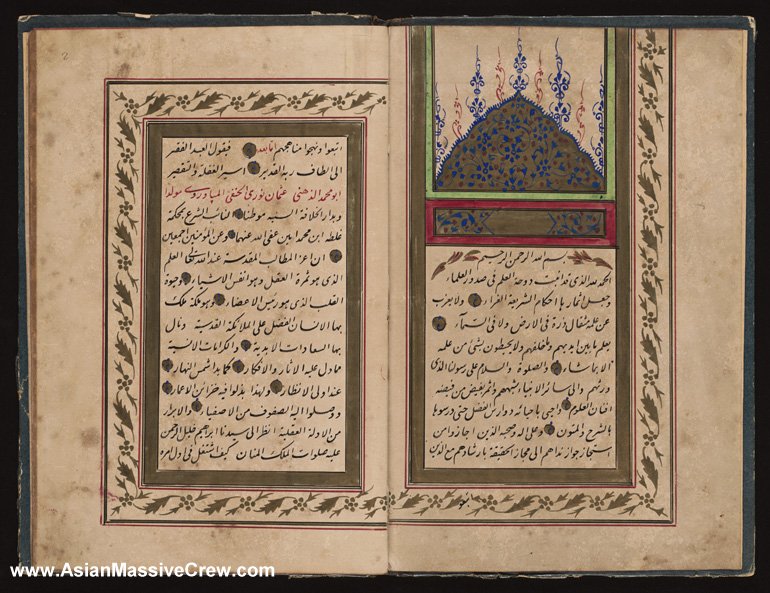
Beinecke Rare Book & Manuscript Library
Two Manuscripts in Persian & Arabic. Ramadan 1307 H / April/May 1890.
1. Sharh-i Bist Bab dar Ma'rifat-i A'mal-i al-Asturlab (Commentary on "Twenty Chapters Dealing with the Uses of the Astrolabe" of Nasir al-Din al-Tusi, 1201-74, by Mulla 'Abd al-'Ali Parchadi. Nasir al-Din al-Tusi, who built the famous observatory in Maraghah (Azarbayjan, Iran) for the Mongol leader Hulagu (grandson of Chingis Khan), was one of the most brilliant minds and the scholar par excellence of the Middle Ages.
2. Hadha Lughz min al-Shaykh (This is a Riddle from the Master). A short mathematical treatise in the form of a riddle. al-Shaykh, the "Master," could well be al-Shaykh Baha' al-Din al-'Amili (1547-1621), who is know to have had a great interest in mathematics. Copied by Mulla 'Abd al-'Ali Parchadi, whose identity could not be ascertained.
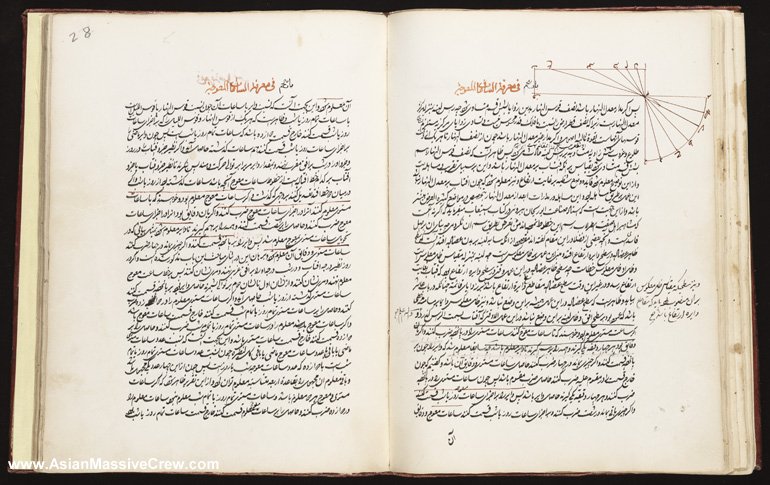
Kitab-i Shahidi [The Book of Shahidi], by al-Mawlawi al-Mughli. Undated, but probably 18th century.
A collection of poems in Ottoman Turkish (i.e. Turkish in Arabic script). The manuscript is written in clear and elegant naskhi script in black ink on white paper, with headings, keywords, and markings in red. The poems are framed in gold, the pages ruled in red line. A floral design in gold and color has been added on folio 2a and a miniature of an Indian smoking a water pipe. A handmade silver plate on the front cover depicts two cranes among shrubs, with the title of the manuscript in Kufi c script at the top. The author could be the Turkish Sufi poet Shahidi Ibrahim Dede (1470- 1550), who was born in Mugla (Turkey). Most likely a unique manuscript.
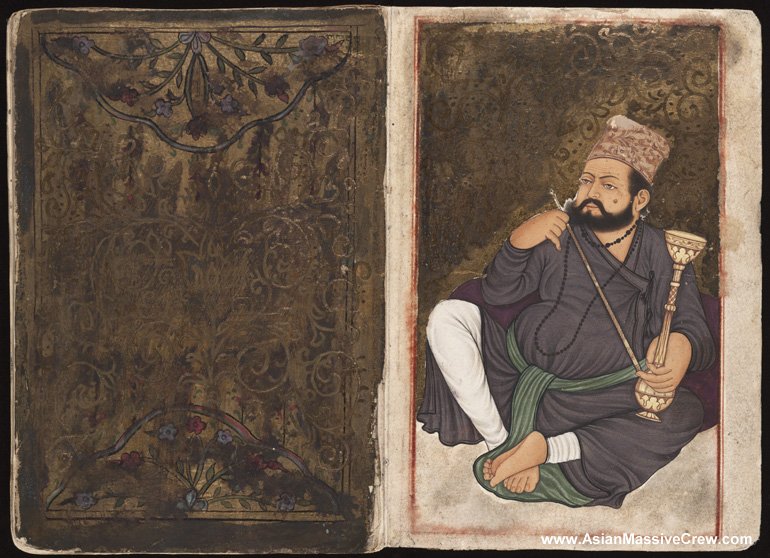
The manuscript, which contains verses from the Koran and invocations is written on a long scroll of vellum placed in a silver hexagonal tube with a cap. Three loops for a chain allow the amulet to be worn as a necklace. The amulet is written in a long central column surrounded by eight colored rectangular compartments. The central part is written in black ink in ruq'ah/ naskhi script, while the compartments are in large thuluth script. The central column contains Surat al-Qadr "The Chapter of Power (ch. 97)," in reference to "Laylat al Qadr" (The Night of Power) in which the Koran was revealed to the Prophet Muhammad, and falls on the 27th of Ramadan. This is followed by Surat al-Fatihah "The Opening Chapter" (ch. 1), followed in order by a long invocation asking God for help and guidance, the famous Shi'i invocation of 'Ali (the first imam) and a magic square. All texts are ruled in gold. All these verses and invocations are meant to have magical powers to protect the owner of this colorful amulet. The compartments contain an elaborate invocation asking God to protect the bearer of the amulet. In Arabic.

Amulet, most likely from the 19th century.
Qur'an [Koran]. Undated, but probably copied in the 18th century.
Chapters from the Koran in beautiful, large Chinese Arabic script, in black ink on white glossy paper. The text is vocalized throughout with Koranic recitation markings in red. All chapter headings are written in red ink. The opening two pages are illuminated in gold, blue, green, red, and other colors. The last page is also illuminated and the text is ruled in two red lines. This undated manuscript was probably copied in the eighteenth century. Bound in contemporary morocco, wallet style with a flap, in the Islamic manner. Covers embossed with central medallions; borders, with a floral design. Chinese manuscripts of the Koran are extremely rare.
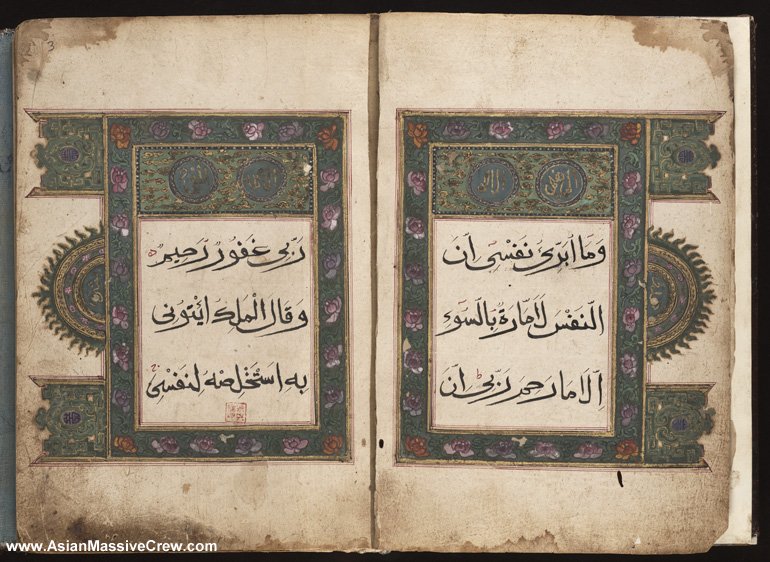
Tahrir Tanqih al-Lubab Sharh [Commentary on the Edition of the Revision of the Essence], by Abu Yahya Zakariya ibn Muhammad al-Ansari (1423-ca. 1520). 26 Safar 1152 H/3 June 1739.
"al-Lubab fi al-Fiqh" [The Essence of Jurisprudence] by Ahmad ibn Muhammad ibn al-Mahamili (d. 1024) was later summarized by Ahmad ibn 'Abd al-Rahim ibn al-'Iraqi (1361-1423) under the title "Tanqih al-Lubab" [Revision of the Essence].
This was abbreviated by al-Ansari as "Tahrir Tanqih al-Lubab" [Edition of the Revision of the Essence]. The present manuscript (most likely unique) is al-Ansari's commentary on his own abbreviation of the book. The manuscript is written in clear naskhi script on white glossy paper, the original text in red, the commentary in black ink.
There are numerous marginal notes in different hands. There are several marginal circular stamps, which read: "This book belongs to al-Sayyid 'Abd al-Baqi al-Bakri, 304." The number undoubtedly refers to the year 1304 H (1886). There are also several marginal rectangular stamps, which read: "Oh Lord! You are Allah. Make it easy for us to know the meaning of 'There is no god but Allah.' This book is dedicated to the Almighty God by al-Sayyid 'Abd al- Baqi al-Bakri al-Siddiq Sibt al-Husayn." Original tan morocco binding, with a flap in the Islamic tradition of bookbinding, where all fascicles are loose within the binding. In Arabic.
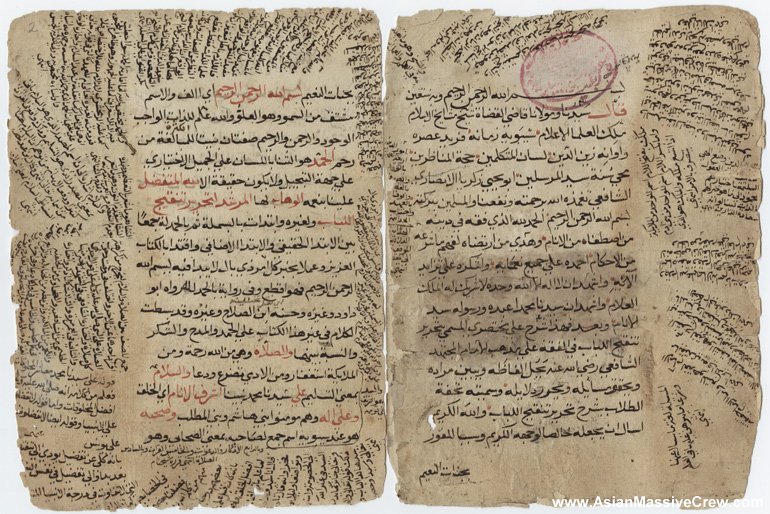
A Collection of 13 Arabic Manuscripts. Undated, but probably copied in the late 18th century.
1. Kitab al-Dumu' [The Book of Tears]. Dated 1181 H/1767, by Ibn al Jawzi, Abu al-Faraj 'Abd al Rahman ibn 'Ali (d. 597 H./ 1200) Also known as "Bahr al-Dumu' [The Sea of Tears].
2. Kitab fi al-Ayyam wa-al-Layali wa-al-Shuhur [A Book about Days, Nights, and Months], by Ibn al Jawzi, Abu al Faraj 'Abd al Rahman ibn 'Ali (d. 597 H./ 1200). Also known as "Kitab al-Nur fi Fadail al-Ayyam wa-al- Shuhur [The Book of Light Regarding the Virtues of Days, and Months].
3. Kitab Adab al-Akl [Book of Etiquette of Eating], by Ibn al-Jawzi, Abu al Faraj 'Abd al Rahman ibn 'Ali (d. 597 H./ 1200). An unrecorded work, probably a unique manuscript.
4. Kitab Adab al-Nikah [Book of the Etiquette of Sexual Intercourse], by Ibn al-Jawzi, Abu al Faraj 'Abd al Rahman ibn 'Ali (d. 597 H./ 1200). The manuscript was copied by Muhammad ibn 'Ali al-Hassani in the year 1181 H/1767. An unrecorded work, most likely a unique manuscript.
5. Tanwir al-Ghabash fi Fada'il al-Sudan wa-al-Habash [Clearing the Darkness Regarding the Virtues of Blacks and Abyssinians], by Ibn al-Jawzi, Abu al Faraj 'Abd al Rahman ibn 'Ali (d. 597 H. / 1200). Copied by Muhammad ibn 'Ali al-Hassani and completed during Dhu al-Hijjah 1181 H/ April 1768.
6. A chapter from an anonymous book, probably by Ibn al-Jawzi, beginning Bab al-'Aql Hujjat Allah 'ala Khalqih [Chapter Concerning the Mind as Proof for the Creatures about the Existence of God].
7. Quotations from al-Hasan ibn Mas'ud al-Yusi (d. 1102 H/1691) regarding the prayer for Prophet Muhammad.
8. An answer given by al-Hasan Ibn Mas'ud al-Yusi comparing reading the Qur'an with other prayers. Copied by Muhammad ibn 'Ali al-Hassani.
9. A quotation from Abu Bakr al-Mutawwa'i, about prophets and saints.
10. A Prayer.
11. A short poem dealing with when one does not have to return a greeting.
12. Excerpts from Tuhfat al-Albab fi 'Aja'ib al-Buldan [Gift to the Intellects Regarding the Wonders of Countries]. An unrecorded work.
13. Excerpts from Hayat al-Hayawan [Life of Animals], by Muhammad ibn Musa al-Damiri (d. 808 H/1405).
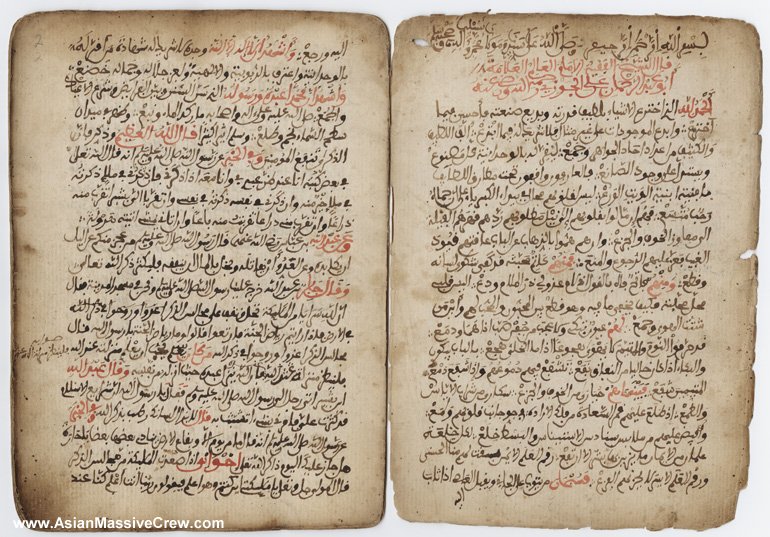
Astronomical Calendar. 1259 H/1843-1844.
An elaborate astronomical calendar for the year 1259 H/1843- 1844 in Ottoman Turkish and Arabic, consisting of one long scroll (108 cm. long and 10.8 cm. wide). The text on one side is written in the form of tables in red, black, and gold. On the other side are the names of the days and months, times of prayer, times of fasting and breaking the fast during the month of Ramadan, calculations of the Qiblah (direction towards the Holy city of Mecca), and personal reading of one's fortune. al-Sayyid al-Hajj 'Abd Allah at-Tarsusi, whose identity could not be ascertained, wrote the manuscript and may be its author.




|
 Posting Rules
Posting Rules
|
You may not post new threads
You may not post replies
You may not post attachments
You may not edit your posts
HTML code is Off
|
|
|
All times are GMT +1. The time now is 21:49.
|